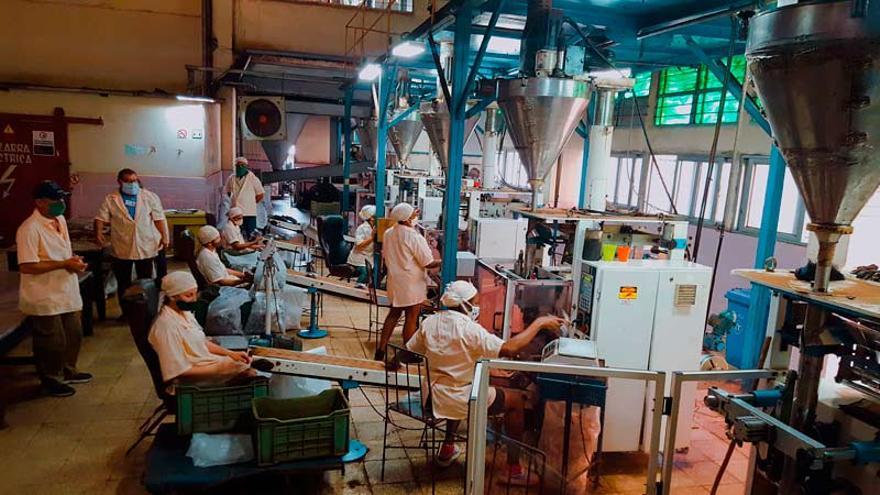
![]() 14ymedio, Havana, 21 September 2023 — It’s been more than four months since the roaster Reynerio Almaguer Paz, from Holguín, produced coffee. According to the explanations that its directors offered to the official press, the last time the factory ground coffee, during July and early August, was thanks to the fact that the producers agreed to sell the State the share that corresponded to their “self-consumption.”
14ymedio, Havana, 21 September 2023 — It’s been more than four months since the roaster Reynerio Almaguer Paz, from Holguín, produced coffee. According to the explanations that its directors offered to the official press, the last time the factory ground coffee, during July and early August, was thanks to the fact that the producers agreed to sell the State the share that corresponded to their “self-consumption.”
The provincial newspaper ¡Ahora! also revealed that the situation, which has continued since May, not only affects the population of Holguín, but also that of Granma and Las Tunas, and it will not be alleviated until the end of the year.
“From the month of November, the raw material starts being delivered, after the [grain] collection stage. In that month you must restart the production and the subsequent distribution of coffee. Other alternatives are being studied to contribute to the gradual solution of the current limitation, but November is the date we now have,” the director of the roasting plant, Rider Sánchez, told the media.
Last July, Reynerio Almaguer packed 30,000 half-pound coffee sachets from the Isla Grande brand
Last July, when the factory processed the raw material bought from producers, Reynerio Almaguer packaged 30,000 half-pound coffee packs from the Isla Grande brand. But, instead of taking advantage of the surplus to alleviate the delay in the standard sale, the roaster decided to sell them at the agricultural fairs that are held in the province on weekends for a “differentiated” cost of 100 pesos, when the ’basic basket’ price, through the ration stores, for the same package is 11 pesos.
The pretext for not selling it “on the ration book,” Sánchez explains, was that the coffee produced was not enough to meet demand. “Our initial idea was to market it to the ration stores, like so many other goods that arrive by that route, but the amount we could access did not supply even half of the municipality of Holguín, so it was decided to sell it at fairs,” he said.
However, the shortage of the product among the population is so drastic that the director of the industry says that, during the days they marketed the coffee, they managed to dispatch between 4,000 and 5,000 bags per week.
Another cause of the production debacle, the official admitted, is the bureaucracy that is established within the industry itself. “I can clarify that the result of the harvest does not reach us directly, since it is intended for the coffee processors Asdrúbal López, from Guantánamo, and Rolando Ayud, from Contramaestre, in Santiago de Cuba, who are our suppliers,” he explains, adding that through importation – another channel for the raw material – they have not received anything so far this year.
To avoid stopping the industry and sending the workers home, the roaster has resorted to “alternative productions”
To avoid stopping the industry and sending the workers home, the roaster has resorted to “alternative productions,” although so far the efforts are not profitable. “We promote the search for agricultural products, such as corn, peanuts and rice, to make derivatives of them. We continue to evaluate these possibilities due to the high cost of acquiring [raw material],” says Sánchez.
The industry also tried to enter the market of pre-prepared food and to promote self-consumption farms. Both routes have been “valued” without major results. However, the manager assures, an attempt is being made at all costs to maintain service to the population.
The lack of coffee is not exclusive to the eastern provinces. In several neighborhoods of Havana, at the other end of the Island, people have not received coffee since May, when it last arrived at the ration stores, according to 14ymedio. The situation contrasts with the regime’s import figures for the month of July, when the country dedicated almost two and a half million dollars to buying coffee from the United States.
On the other hand, the Italian association Filorosso, which recently financed the shipment of ambulances to Santiago de Cuba, collects for its “donations” to the Island in kind. On its website, the organization offers at least a dozen Cuban products, including various foods such as chocolate, rum and coffee, all of which are impossible to get in Cuba except at prohibitive prices.
One kilogram [2.2 pounds] of coffee beans from the Frente Oriental brand – which is produced in Santiago but not marketed on the Island – is sold on the Italian website for 15 euros, while a 8.8-ounce package of that product, ground, costs 4.50.
Translated by Regina Anavy
____________
COLLABORATE WITH OUR WORK: The 14ymedio team is committed to practicing serious journalism that reflects Cuba’s reality in all its depth. Thank you for joining us on this long journey. We invite you to continue supporting us by becoming a member of 14ymedio now. Together we can continue transforming journalism in Cuba.
